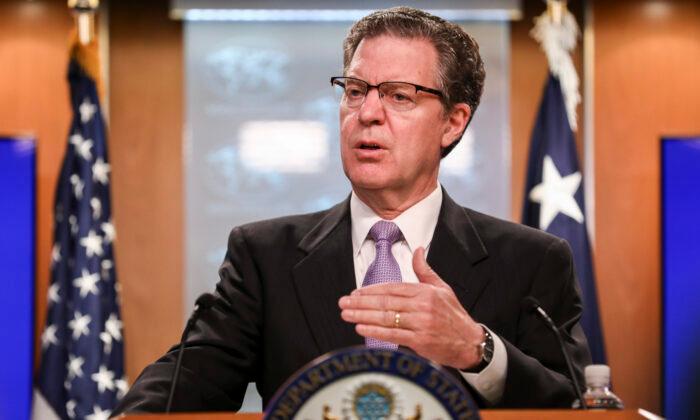The U.S. Ambassador-at-Large for International Religious Freedom called on governments to release their religious prisoners amid the current pandemic. One of the countries singled out by the ambassador was China.
Brownback called on several countries to release their religious prisoners, including Iran, Vietnam, Russia, Eritrea, and China.
“China continues to have a number of people imprisoned for their faith,” Brownback said, pointing to Muslim ethnic minorities in Xinjiang; believers of Protestant, Catholic, and house churches; Tibetan Buddhists; and Falun Gong adherents.
“Those [in China] should all be released in this time of pandemic,” he said.
Brownback also urged governments to ensure religious minorities receive medical aid should they be impacted by the virus.
“We’ve seen a situation in several countries where oftentimes a religious minority is excluded from the public health need and distribution in nations, and we’re calling on all nations to distribute this at this time of pandemic to all communities regardless of religious affiliation or otherwise,” he said.
He also urged governments not to blame religious minorities as the source of the virus, though he did not name specific examples.
“We are seeing that sort of blame game getting started up in different places around the world, and we hope it gets pushed back aggressively by those host governments,” Brownback said.
On April 2, the Congressional-Executive Commission on China (CECC) also joined in the call for Falun Gong adherents imprisoned in China to be freed.
Falun Gong
Falun Gong, also known as Falun Dafa, is an ancient spiritual practice with meditative exercises and moral teachings based on three principles, truthfulness, compassion, and tolerance. The practice was enormously popular in China; by the late 1990s, there were about 70 million to 100 million adherents, according to official estimates.China’s persecution against Falun Gong adherents has continued amid the global pandemic.
Harassment typically is in the form of authorities ransacking practitioners’ homes or pressuring them to sign official documents promising to give up their faith.
Zou was detained at a prison in Liaoning’s Jinzhou city in September 2019, then transferred to the Dalian prison in November.
On March 16, Tang Huanxiang and Tang Shuhua, residents of Tianmen city in Hubei province—the region hardest-hit by the virus—were taken to a local police station after some volunteers tipped off the police. The volunteers spotted the two Falun Gong practitioners passing out flyers about the Chinese regime’s persecution.
They were held overnight at a police station in Zaoshi, a county in Tianmen. Police searched their homes. They were released at about 4 p.m. the following day.






Friends Read Free